Jacksonville Addiction Treatment & Mental Health Resources Guide
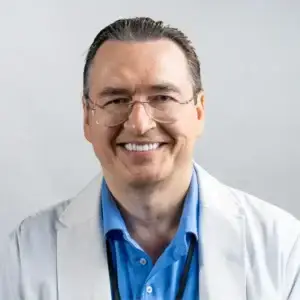
Dr. Rostislav Ignatov, MD
Chief Medical Officer
In Jacksonville, the impact of addiction shows up unevenly from one neighborhood to the next. Yet even in the face of these disparities, the city has built a web of care that reaches from hospital emergency rooms to community streets. Patients can connect with medication-assisted treatment through providers like Gateway Community Services, hospital peer specialists through Project Save Lives, and round-the-clock Mobile Response Teams that respond to behavioral health crises.
The broader picture shows cautious progress. Across the nation, overdose deaths fell by nearly 27% between 2023 and 2024. Florida also saw encouraging changes: a 7% drop in drug-related deaths, an 11% decline in opioid-caused deaths, and an improvement in the state’s overdose death rate from 35.2 to 31.7 per 100,000. In Jacksonville, the change is visible on the ground. Fire and Rescue crews answered an average of 240 opioid-related overdose calls per month in 2023, falling to about 153 calls per month in 2024. The state’s massive naloxone distribution—more than 1.8 million kits now in circulation—adds another layer of safety alongside peer support, housing, and formal treatment.
This guide is designed to help you navigate that system: where to turn in a crisis, how to access treatment, and what community supports exist so that help is never far away.
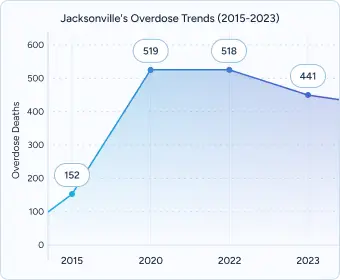
In Duval County, overdose deaths (drug poisoning; county of residence) rose from 152 in 2015 to 519 in 2020 (≈241% increase). More recently, they fell from 518 in 2022 to 441 in 2023 (−77 deaths; ≈15%). Statewide, opioid-related deaths also declined in 2023 (≈10–11% year-over-year).
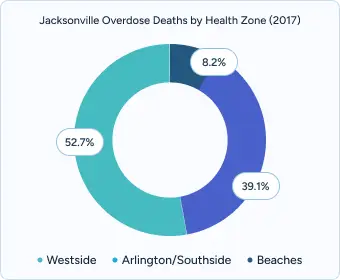
Overdose risk isn’t spread evenly across Jacksonville. In 2017, the Westside (Health Zone 2) accounted for about 32% of all overdose deaths in Duval County, and Arlington/Southside (Health Zone 4) made up 23.7%. By comparison, the Beaches (Health Zone 6—Jacksonville Beach, Neptune Beach, Atlantic Beach) accounted for a small share and have generally stayed at the low end of overdose measures. Overall deaths rose from 152 in 2015 to 571 in 2020—about a 276% increase—with the heaviest burden concentrated in lower-income neighborhoods like the Urban Core and Westside.
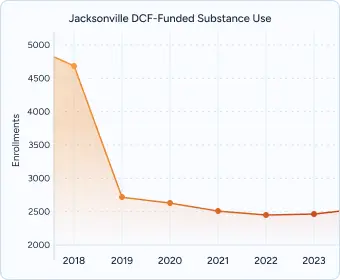
Adult enrollments in DCF-funded substance use treatment programs for Duval County fell from 4,698 in 2018 to 2,715 in 2019, then settled near 2,472–2,487 in 2022–2023—about a 47% drop versus 2018, with COVID-era volatility in 2020–2021. While DCF-funded adult enrollments in Duval fell ~47% from 4,698 (2018) to 2,487 (2023), local harm indicators moved the other way. From 2018–2022, Duval’s opioid overdose death rate rose ~67%, and 3,339 residents died from unintentional overdoses (2016–2023); in 2023, Jacksonville Fire and Rescue Department still answered ~240 opioid-related overdose calls per month. Together, this suggests need remained high (or grew) even as formal program enrollments declined.
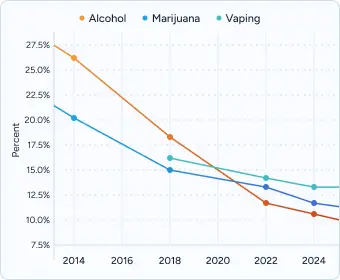
Among Duval County high school students, past-30-day alcohol use fell from 28.4% (2014) to 10.4% (2024), and marijuana use declined from 20.1% to 11.8%. Vaping rates, first measured in 2018, have been roughly flat or slightly down through 2024. In 2024, 41.0% reported feeling depressed or sad most days in the past year, and 9.9% said they seriously considered suicide (12.5% across all grades). Depression indicators rose for years, peaking around 2022, then eased in 2024, but levels remain concerning.
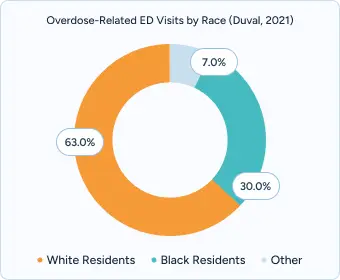
By 2021, Duval County’s overdose mortality reached 59.8 per 100,000 (5th-highest in Florida), and the opioid-overdose death rate increased 67% from 2018 to 2022; in total, more than 3,300 residents died of unintentional overdoses from 2016–2023. Local surveillance also shows heavier overdose burden in White residents based on ED/EMS encounters (e.g., 63% of overdose-related ED visits were among White residents in 2021, vs. 30% among Black residents). These differences underscore the need for culturally responsive care and equitable early-intervention services across Jacksonville’s diverse communities.

Gateway Community Services operates a centralized Information & Assessment Center for treatment information and referrals. Through Project Save Lives, peer recovery specialists are embedded in local emergency departments to connect people to medical detox, residential treatment, and MAT; Gateway also coordinates outpatient care and partners with community clinics. Gateway’s prevention programs alone reach ~4,300 people a year, and overall the organization engages thousands of Jacksonville residents annually.
Duval County’s Mobile Response Team (Child Guidance Center) provides 24/7 mobile crisis intervention countywide via 988 or 904-982-4911, offering on-site assessment, de-escalation, and safety planning to reduce ER/law-enforcement involvement.
JTA’s network links neighborhoods to treatment and support. Along the Arlington Expressway/Regency corridor, the First Coast Flyer Red Line and Route 19 (Arlington) connect to Downtown. Multiple lines serve the Westside from Downtown (e.g., 14, 30, 31, 51, 32). For riders with mobility challenges, JTA’s Connexion paratransit provides destination-to-destination (door-to-door–style) service for ADA-eligible customers.
Florida Medicaid plans cover medically necessary mental health and substance use treatment, including detox/inpatient when criteria are met and FDA-approved medications for opioid use disorder (e.g., buprenorphine; methadone via certified OTPs). Benefits and any copays vary by plan. To apply for Medicaid, use DCF’s MyACCESS portal. For help choosing a Medicaid plan, call Florida Medicaid Choice Counseling: 1-877-711-3662.
Florida KidCare (children & teens) Covers children under 19 in families up to 300% of the federal poverty level. Apply at FloridaKidCare.org or call 1-888-540-KIDS (5437) for English or Spanish assistance.
SAMH — DCF’s Substance Abuse and Mental Health program offers state-funded assistance for uninsured or ineligible adults and youth up to 150% of the federal poverty level. Apply through the Circuit 4 SAMH office at 5920 Arlington Expressway or call (904) 485-9583 for enrollment assistance.
City of Jacksonville Mental Health Services provides navigation and crisis support for uninsured residents. For immediate crisis support, call or text 988 (24/7). The City’s mental health services page lists local providers and contacts to access wraparound funding, emergency evaluations, crisis stabilization, and referrals across community agencies via Jacksonville.gov’s mental health resources page.
For individuals seeking confidential, expedited care without long waitlists, several Jacksonville-area facilities offer immediate admission and complimentary insurance verification. These programs deliver comprehensive assessments, medical detox as needed, and a range of evidence-based therapies such as cognitive-behavioral therapy, trauma-informed counseling, and medication-assisted treatment.
Private facilities often provide advantages over publicly funded programs including:
Most centers complete insurance authorization within 24 hours and can arrange same-day admissions when clinically appropriate.
The Haven Detox – Florida serves Jacksonville and greater Northeast Florida with immediate access to evidence-based treatment. The facility offers a comprehensive approach that combines proven clinical therapies—such as Cognitive Behavioral Therapy (CBT) and Dialectical Behavior Therapy (DBT)—with a range of holistic and innovative healing options.
Our specialized services include:
With 24/7 medical detox supervision and one of the highest staff-to-client ratios in South Florida, the West Palm Beach location offers both short-term detox and residential programs. Clients experience a resort-style environment featuring professionally catered meals, a fully equipped gym, a game room, and outdoor recreation areas.
The Haven serves individuals with co-occurring substance use and mental health disorders and accepts most major insurance plans, including Florida Blue, Cigna, Aetna, Medicaid, Medicare and TRICARE.
Jacksonville mental health services span multiple neighborhoods with specialized programming. Comprehensive outpatient care—including depression and anxiety treatment, trauma-informed therapy, and dual-diagnosis support—is delivered by the Mental Health Center of Jacksonville, with clinics in Riverside, Northside, and Westside. Programs emphasize culturally competent care and bilingual providers.
Neighborhood-specific resources ensure accessibility: Riverside and San Marco residents are served by two MHJCJ FACT teams (east and west of the St. Johns River), Duval County’s Mobile Response Team offers 24/7 in-home crisis intervention citywide, and the JANGEL jail-diversion program on the Westside provides crisis stabilization, case management, and linkage to community treatment for individuals arrested on mental health or substance-related charges.
Springfield Recovery Drop-In Center (157 E. 8th St, 904-359-2511) provides free peer-led recovery support, specialized trauma groups, and daily sober social activities with evening hours Tuesday through Saturday.
The Riverhouse Peer Support Center (5930 Arlington Expressway, 904-726-0026) offers culturally responsive recovery groups, transit-accessible access, and weekend workshops, with active community engagement via @RiverhouseJax on social media.
NAMI Jacksonville Connection Recovery Support Groups serve adults 18+ with mental health and co-occurring substance use challenges. Professionally facilitated meetings occur both online and in-person, helping participants build coping skills and social connections. Contact the NAMI Jacksonville Helpline at 904-323-4723 or email [email protected] for schedules and locations.
NorthEast Florida Sober Living Alliance maintains a directory of NARR-certified transitional residences meeting national recovery housing standards. Visit nefsolberlivingalliance.org to find certified homes offering structured environments, peer support, and life skills programming.
City Houses operates gender-specific sober living residences with amenities such as meals, group therapy, transportation support for work requirements, and individual peer specialist support. Locations are transit-accessible across Jacksonville.
Sober Living America – Jacksonville holds Florida state certification and provides apartment-style recovery housing with roommate living, same-day admission options, on-site and partner recovery meetings, vocational counseling, and career coaching. Staff assist residents with insurance navigation and referrals.
AA Jacksonville Central Service Office coordinates over 70 weekly AA meetings across the city, with daily updates on its website. First Coast Area NA (firstcoastna.org) maintains 59 weekly NA meetings in 34 groups and syncs schedules with the “Meeting Guide” mobile app for real-time updates.
Spanish-language and LGBTQ+ meetings serve Jacksonville’s diverse communities, with multiple weekly gatherings in Riverside, Arlington, and San Marco. Interpretation services and specialty meetings—for women, young adults, and recovery veterans—are available through volunteer coordinators and intergroup offices.
Comprehensive assessment should address both addiction and mental health conditions, as co-occurring disorders affect over 50% of individuals seeking treatment in Jacksonville.
Medication-assisted treatment (MAT) availability indicates quality addiction programming in Jacksonville facilities. Effective programs offer buprenorphine (Suboxone), naltrexone (Vivitrol), and methadone when appropriate, combined with counseling and behavioral therapies.
Cultural competency becomes essential in Jacksonville’s diverse neighborhoods. Seek providers offering services in your preferred language, understanding of cultural backgrounds, and specialized programming for Latino (11.6% of population), African American (30% of population), LGBTQ+, and other communities across the city.
Aftercare coordination begins during active treatment and focuses on seamless transitions. Effective programs connect clients with outpatient therapy, peer-led recovery groups like NAMI Connection, and transitional sober living through warm handoffs and ongoing community partnerships.
Family engagement and support improves long-term recovery outcomes. Multi-family therapy sessions and educational workshops help families understand addiction as a chronic disease requiring ongoing management. Culturally tailored family services include Spanish-language family groups and LGBTQ+-affirming family therapy options.
Evidence-based therapies form the foundation of effective treatment by addressing both substance use and mental health conditions. Approaches such as trauma-focused interventions, cognitive-behavioral therapy (CBT), and dialectical behavior therapy (DBT) have proven efficacy in reducing relapse risk and building coping skills.
Alumni networks and continuing care extend support beyond formal programs. These initiatives include lifetime access to peer-led support groups, periodic check-ins, and virtual workshops that help individuals navigate life challenges and reinforce recovery gains long after discharge.
Insurance coordination and advocacy ensures clients maximize their benefits and maintain coverage. Experienced specialists guide individuals through complex coverage rules, expedite authorizations, and connect clients with community resources to prevent disruptions in recovery.
Professional treatment represents an investment in recovery success, offering immediate access, personalized care, and comprehensive services designed to address the complex nature of addiction and mental health conditions.
Begin your recovery journey with immediate professional support and guidance.
At The Haven Detox, insurance benefits are verified almost instantly, so you know what your plan covers before treatment begins. Financial advocates provide clear cost estimates and walk you through available options, including sliding-scale fees and payment plans. With this support, you can focus on getting care while knowing that coverage and costs are being handled quickly and transparently.
Same-day clinical evaluations available, with same-day residential placement coordination when appropriate. Comprehensive assessments address medical history, substance use patterns, mental health conditions, and family dynamics to inform individualized treatment planning.
Most programs schedule an initial assessment within 48 hours, then connect you with a therapist based on your needs and preferences.
Medicaid and state plans typically cover individual and group therapy; check your policy for copay details and eligibility criteria.
Yes. Many community centers offer bilingual and multilingual peer-support meetings, with interpreters or native-language facilitators available.
Several nonprofit clinics provide sliding-scale fees and grant-funded treatment; inquire about financial assistance when contacting the intake office.
Some programs partner with ride-share services and JTA transit to offer free or low-cost transportation vouchers for clients.
Crisis hotlines and mobile response teams operate 24/7—call 988 for immediate mental health or substance-related support.
Yes. Family peer specialists offer confidential coaching and referrals to Al-Anon, family therapy, or intervention services.
Look for centers offering LGBTQ-affirming groups, Hispanic/Latino culturally responsive services, and faith-based support tailored to diverse communities.
Yes. Alternative Peer Group programs, campus outreach initiatives, and peer-led support circles designed specifically for college-aged individuals and young adults.
24/7 Support
No Commitment
100% Private
There’s no catch. Checking your insurance is simply a way to see what your plan covers — it doesn’t lock you into treatment, notify anyone, or cost you anything. You get answers upfront to decide what makes sense for you.
Protecting your privacy matters! No information or notifications are ever sent to your employer or family — whether you check your insurance online or call. Everything is handled through secure, encrypted systems that meet strict medical privacy laws. You stay in control of your information!
Luckily, most insurance policies cover treatment here. Depending on the healthcare you’ve already had this year, costs could even be zero. Instead of worrying, let’s just find out what your plan covers.
Most likely. We work with major providers like Cigna, Aetna, and United Healthcare, public insurances like Tricare and tribal plans, and even smaller plans like Surest Bind and Harvard Pilgrim. The quickest way to know for sure is to check online or call. It’s a quick, private way to understand what is covered upfront.
Verifying your insurance isn’t a commitment to start treatment — it’s simply a way to see what your options are. Knowing your coverage ahead of time helps you make more informed, confident decisions. It also helps flag a spot, so you’re able to get right in if you ever do decide you’re ready.
You need your policy number to check your specific policy online. If you want general information, just call. You likely have questions beyond insurance anyway. Reaching out now helps you figure out the right fit if or when you’re ready. You don’t have to put off the call until you’re in crisis. Calling is not scary, I promise!